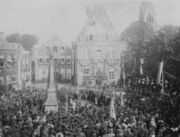
Sedantag
Encyclopedia


German Empire
The German Empire refers to Germany during the "Second Reich" period from the unification of Germany and proclamation of Wilhelm I as German Emperor on 18 January 1871, to 1918, when it became a federal republic after defeat in World War I and the abdication of the Emperor, Wilhelm II.The German...
celebrated on the second of September to commemorate Emperor
German Emperor
This article is about the emperors of the German Empire. For full list of German monarchs before 1871, see List of German monarchs.The German Emperor was the official title of the Head of State and ruler of the German Empire, beginning with the proclamation of Wilhelm I as emperor during the...
Frederick III
Frederick III, German Emperor
Frederick III was German Emperor and King of Prussia for 99 days in 1888, the Year of the Three Emperors. Friedrich Wilhelm Nikolaus Karl known informally as Fritz, was the only son of Emperor William I and was raised in his family's tradition of military service...
's victory in the Battle of Sedan
Battle of Sedan
The Battle of Sedan was fought during the Franco-Prussian War on 1 September 1870. It resulted in the capture of Emperor Napoleon III and large numbers of his troops and for all intents and purposes decided the war in favour of Prussia and its allies, though fighting continued under a new French...
. After the French emperor Napoleon III had declared the Franco-Prussian War
Franco-Prussian War
The Franco-Prussian War or Franco-German War, often referred to in France as the 1870 War was a conflict between the Second French Empire and the Kingdom of Prussia. Prussia was aided by the North German Confederation, of which it was a member, and the South German states of Baden, Württemberg and...
a few weeks earlier, he and his army were taken prisoner in the fortress of Sedan by Prussian troops, a major step to eventual victory.
In 1871, the now united Germans could hardly agree on a common German holiday, as most were related to the Prussian royal family. While the German Emperor and Empire was proclaimed on 18 January 1871, the Prussians themselves held the first coronation of a Prussian king on the same day in 1701 in higher esteem. The signing of the final peace Treaty of Frankfurt, several months later on 10 May 1871, was also not equivocally welcomed. The southern states of Bavaria
Bavaria
Bavaria, formally the Free State of Bavaria is a state of Germany, located in the southeast of Germany. With an area of , it is the largest state by area, forming almost 20% of the total land area of Germany...
, Baden and Württemberg preferred to celebrate the victories in battles to which their troops had contributed significantly, like the Battle of Wörth which had occurred already on 6 August 1870.
While never proclaimed officially, participation and official support for Sedantag celebrations varied over time, and working class leaders never really accepted it. It became a de-facto national holiday, last celebrated in 1918.
After the Treaty of Versailles had been signed in mid 1919, on 27 August 1919 the Innenministerium of the Weimar Republic
Weimar Republic
The Weimar Republic is the name given by historians to the parliamentary republic established in 1919 in Germany to replace the imperial form of government...
declared that no further Sedantag celebrations should take place.
Literature
- Florentine Gebhart: Erinnerung an das Sedanfest in den 1870er Jahren. In: Blätter aus dem Lebensbilderbuch. Berlin 1930, S. 51–54 (Nachdruck in Jens Flemmin (Hrsg.): Quellen zur Alltagsgeschichte der Deutschen vom Mittelalter bis heute. Band 7. 1871–1914. Wissenschaftliche Buchgesellschaft, Darmstadt 1997, ISBN 3-534-11496-5, S. 61-64; außerdem frei verfügbar als PDF)
- Thomas Rohkrämer: Der Militarismus der „kleinen Leute“. Die Kriegervereine im Deutschen Kaiserreich 1871–1914. (= Beiträge zur Militärgeschichte; Bd. 29). Oldenbourg, München 1990, ISBN 3-486-55859-5 (zugl. Dissertation, Universität Freiburg im Breisgau, 1989)
- Fritz Schellack: Nationalfeiertage in Deutschland 1871 bis 1945. Peter Lang, Frankfurt am Main u. a. 1990, ISBN 3-631-42524-4 (zugl. Dissertation, Universität Mainz 1989)
- Jakob Vogel: Nationen im Gleichschritt. (= Kritische Studien zur Geschichtswissenschaft; Bd. 118). Vandenhoeck & Ruprecht, Göttingen 1997, ISBN 3-525-35781-8 (zugl. Dissertation, FU Berlin, 1995)
- Rüdiger Wulf: „Hurra, heut ist ein froher Tag, des Kaisers Wiegenfest!“ Schulfeiern zum Kaisergeburtstag und zum Sedantag des Kaiserreichs. In: Jochen Löher und Rüdiger Wulf (Hrsg.): „Furchtbar dräute der Erbfeind!“ Vaterländische Erziehung in den Schulen des Kaiserreichs 1871–1918. (= Schriftenreihe des Westfälischen Schulmuseums Dortmund; Band 3). Westfälisches Schulmuseum, Dortmund 1998, S. 57–95
- Landeshauptarchiv Koblenz, Landesarchivverwaltung Rheinland-Pfalz: Vor 100 Jahren – Der Sedantag am 2. September 1899 (Archivseite)
External links
- Kapitel Sedanfeier in: Wilhelm Heinrich RiehlWilhelm Heinrich RiehlWilhelm Heinrich Riehl was a German journalist, novelist and folklorist.Riehl was born in Biebrich in the Duchy of Nassau and died in Munich....
: Ein ganzer Mann, Roman, 1897 - O. P.: Sedantag oder Nationalfest?, kritischer Artikel in der Wochenzeitschrift Ethische Kultur, 1. September 1900

